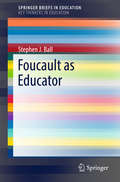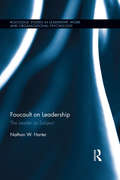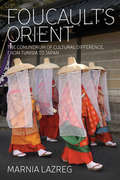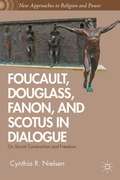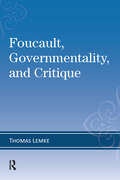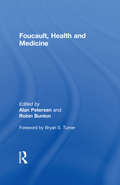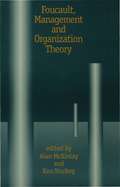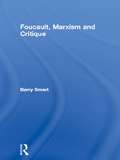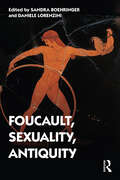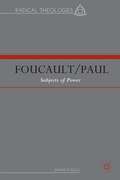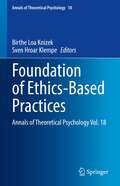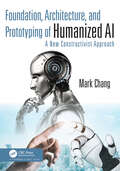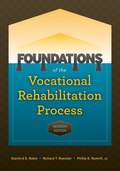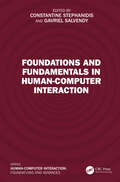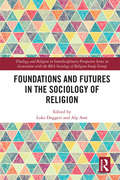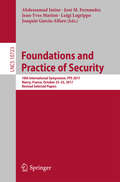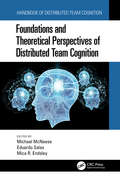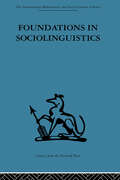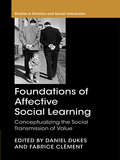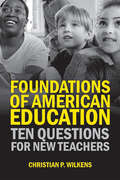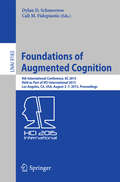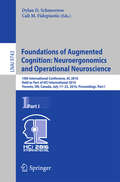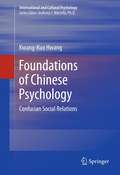- Table View
- List View
Foucault as Educator
by Stephen J. BallThis book considers Foucault as educator in three main ways. First, through some consideration of what his work says about education as a social and political practice. That is, education as a form of what Allen (2014) calls benign violence – which operates through mundane, quotidian disciplinary technologies and expert knowledges which together construct a ‘pedagogical machine’. Second, through an exploration of his ‘method’ as a form of critique. That is, as a way of showing that things are ‘not as necessary as all that’, a way of addressing what is intolerable. This suggests that critique is education of a kind. Third, through a discussion of some of Foucault's later work on subjectivity and in particular on ‘the care of the self’ or what we might call ‘a pedagogy of the self’. Each chapter introduces and discusses some relevant examples from educational settings to illustrate and enact Foucault’s analytics.
Foucault lesen (essentials)
by Frieder VogelmannDieses essential stellt einen systematischen und philosophischen Lekturevorschlag zur Diskussion: Systematisch werden Foucaults Schriften von seiner methodologischen Perspektive her als nihilistische, nominalistische und historizistische Analyse von Praktiken und den in ihnen produzierten Wirklichkeiten entlang der drei Achsen des Wissens, der Macht und der Selbstverhaltnisse gedeutet. Die Konsequenzen dieser Interpretation werden anhand der Positionen umrissen, die sich in Bezug auf Foucaults Kritikbegriff, seine Attacke auf die Human- und, als Teil davon, die Sozialwissenschaften und sein Verhaltnis zum Neoliberalismus ergeben. Philosophisch ist dieser Lekturevorschlag, weil er die Historisierung von Wahrheit als Kern von Foucaults philosophischem Verfahren behauptet. "
Foucault on Leadership: The Leader as Subject (Routledge Studies in Leadership, Work and Organizational Psychology)
by Nathan W. HarterMichel Foucault, one of the most cited scholars in the social sciences, devoted his last three lectures to a study of leader development. Going back to pagan sources, Foucault found a persistent theme in Hellenistic antiquity that, in order to qualify for leadership, a person must undergo processes of subjectivation, which is simply the way that a person becomes a Subject. From this perspective, an aspiring leader first becomes a Subject who happens to lead. These processes depend on a condition of parresia, which is truth-telling at great risk that is for the edification of the other person. A leader requires a mentor and advisors in order to lead successfully, while also developing the capacity in one’s own mind to heed the truth. In other words, a leader must learn how to guide oneself. A valuable contribution to the field of leadership studies, this book summarizes these last lectures as they pertain to the study and practice of leadership, emphasizing the role of ethics and truth-telling as a check on power. It then presents several other contexts where these same lessons can be seen in practice, including in the life of Alexander Solzhenitsyn, whose career as a writer epitomized speaking truth to power, and somewhat surprisingly in the United States military, in response to its twenty-first century mission of counterinsurgency.
Foucault's New Domains
by Terry Johnson Mike GaneThis major collection brings Foucault's later work into sharp focus and illustrates some of the ways in which it is informing developments in the social sciences. Concise, clear and wide-ranging it provides an essential accessory to the understanding one of the key thinkers in the twentieth century.
Foucault's Orient: The Conundrum of Cultural Difference, From Tunisia to Japan
by Marnia LazregFoucault lived in Tunisia for two years and travelled to Japan and Iran more than once. Yet throughout his critical scholarship, he insisted that the cultures of the "Orient" constitute the "limit" of Western rationality. Using archival research supplemented by interviews with key scholars in Tunisia, Japan and France, this book examines the philosophical sources, evolution as well as contradictions of Foucault's experience with non-Western cultures. Beyond tracing Foucault's journey into the world of otherness, the book reveals the personal, political as well as methodological effects of a radical conception of cultural difference that extolled the local over the cosmopolitan.
Foucault, Douglass, Fanon, and Scotus in Dialogue
by Cynthia R. NielsenThrough examining Douglass's and Fanon's concrete experiences of oppression, Cynthia R. Nielsen demonstrates the empirical validity of Foucault's theoretical analyses concerning power, resistance, and subject-formation. Going beyond merely confirming Foucault's insights, Douglass and Fanon expand, strengthen, and offer correctives to the emancipatory dimensions of Foucault's project. Unlike Foucault, Douglass and Fanon were not hesitant to make transhistorical judgments condemning slavery and colonization. Foucault's reticence here signals a weakness in his account of human being. This weakness sets him at cross-purposes not only with Scotus, but also with Douglass and Fanon. Scotus's anthropology provides a basis for transhistorical moral critique; thus he is a valuable dialogue partner for those concerned about social justice and human flourishing.
Foucault, Governmentality, and Critique
by Thomas LemkeMichel Foucault is one of the most cited authors in social science. This book discusses one of his most influential concepts: governmentality. Reconstructing its emergence in Foucault's analytics of power, the book explores the theoretical strengths the concept of governmentality offers for political analysis and critique. It highlights the intimate link between neoliberal rationalities and the problem of biopolitics including issues around genetic and reproductive technologies. This book is a useful introduction to Foucault's work on power and governmentality suitable for experts and students alike
Foucault, Health and Medicine
by Alan Petersen Robin BuntonThe reception of Michel Foucault's work in the social sciences and humanities has been phenomenal. Foucault's concepts and methodology have encouraged new approaches to old problems and opened up new lines of enquiry. This book assesses the contribution of Foucault's work to research and thinking in the area of health and medicine, and shows how key researchers in the sociology of health and illness are currently engaging with his ideas. Foucault, Health and Medicine explores such important issues as: Foucault's concept of 'discourse', the critique of the 'medicalization' thesis, the analysis of the body and the self, Foucault's concept of 'bio-power' in the analysis of health education, the implications of Foucault's ideas for feminist research on embodiment and gendered subjectivities, the application of Foucault's notion of governmentality to the analysis of health policy, health promotion, and the consumption of health. Foucault, Health and Medicine offers a `state of the art' overview of Foucaldian scholarship in the area of health and medicine. It will provide a key reference for both students and researchers working in the areas of medical sociology, health policy, health promotion and feminist studies.
Foucault, Management and Organization Theory: From Panopticon to Technologies of Self (Organization Studies)
by Ken P Starkey Professor Alan McKinlayThis volume draws together critical assessments of Michel Foucault's contribution to our understanding of the making and remaking of the modern organization. The volume provides a valuable summary of Foucault's contribution to organization theory, which also challenges the conventions of traditional organizational analysis. By applying Foucauldian concepts such as discipline, surveillance and power/knowledge, the authors shed new light on the genesis of the modern organization and raise fresh questions about organization theory. The bureaucratic career is, for example, analyzed as a disciplinary device, a mechanism that seeks to alter rational choice rather than constrain bodies. This raises questions about Foucault's linking of the modern organization's birth with the enlightenment. Other contributions review the impact of totalizing managerial discourses and the limits and possiblities of resistance, and question the profound pessimism of Foucault. The volume concludes by examining the implications of Foucault's later work in which he suggests that people are much freer than they feel.
Foucault, Marxism and Critique (Routledge Library Editions: Michel Foucault)
by Barry SmartIn this work, originally released in 1983, Barry Smart examines the relevance of Foucault's work for developing an understanding of those issues which lie beyond the limits of Marxist theory and analysis - issues such as 'individualising' forms of power, power-knowledge relations, the rise of 'the social', and the associated socialisation of politics. He argues that there exist clear and substantial differences between Foucault's genealogical analysis and that of Marxist theory. Smart thus presents Foucault's work as a new form of critical theory, whose object is a critical analysis of rationalities, and of how relations of power are rationalised.
Foucault, Sexuality, Antiquity
by Sandra BoehringerFoucault, Sexuality, Antiquity, published for the first time in English, takes an interdisciplinary approach to exploring how the work of Michel Foucault has influenced studies of ancient Greece and Rome. Foucault’s The History of Sexuality has had a profound and lasting impact across the humanities and social sciences. In the two volumes dedicated to pagan antiquity, Foucault provided scholars with new questions for addressing ancient Greek and Roman societies, and an original epistemological framework for thinking about eroticism and about the processes by which individuals are led to recognize themselves as the subjects of their desires. Now, decades later, the scholars in this volume explore Foucault’s role in shaping and reorienting discussions of antiquity in the fields of philosophy, gender studies, and psychoanalysis, among others. A multidisciplinary exploration of Foucault’s work and its relationship to our understanding of ancient Greco-Roman societies, Foucault, Sexuality, Antiquity will be of interest to students and scholars in classical studies, philosophy, gender studies, and ancient history.
Foucault/paul
by Sophie FuggleWhat is power? Where does it come from and who is in possession of it? How should we think about power and authority in a post-secular society in which traditional boundaries between individual and collective faith and secular governments and institutions are becoming increasingly blurred? The way which we conceive of power in the twenty-first century will effectively determine how we approach issues such as market reform and environmental disaster. Placing the twentieth-century French philosopher Michel Foucault into critical conjunction with the apostle Paul, Foucault/Paul re-evaluates the way in which power operates within society and underpins our ethical and political actions.
Foundation of Ethics-Based Practices: Annals of Theoretical Psychology Vol. 18 (Annals of Theoretical Psychology #18)
by Sven Hroar Klempe Birthe Loa KnizekThis book contrasts earlier textbooks on “evidence-based practices.” Whereas the latter is a slogan that call for scientific evidence to be used in standardized treatment manuals, ethics-based practices call for individualized treatment that makes the situation meaningful for the patient. The main argument for changing the treatment design from being evidence-based to one based on ethics, is the hypothesis that good health care is based on treatment which makes the situation positive and meaningful for the patient. The awareness for this is primarily provided by ethical considerations.
Foundation, Architecture, and Prototyping of Humanized AI: A New Constructivist Approach
by Mark ChangHumanized AI (HAI), emerging as the next of the AI waves, refers to artificial social beings that are very close to humans in various aspects, beings who are machine-race humans, not digital slaves. Foundation, Architecture, and Prototyping of HAI deploy a novel smalldata approach to vertically explore the spectrum of HAI. Different from the popular big-data philosophy that is based on the rigid notion that the connotation of each concept is fixed and the same to everyone, this book treats understanding as a process from simple to complex, and uses the similarity principle to effectively deal with novelties. Combining the efficiency of the Behaviorists’ goal-driven approach and the flexibility of a Constructivists’ approach, both the architecture of HAI and the philosophical discussions arising from it are elaborated upon. Advancing a unique approach to the concept of HAI, this book appeals to professors and students of both AI and philosophy, as well as industry professionals looking to stay at the forefront of developments within the field.
Foundations Of The Vocational Rehabilitation Process
by Richard Roessler Stanford E. Rubin Phillip D. RumrillThe seventh edition of Foundations of the Vocational Rehabilitation Process provides historical, philosophical, legislative, and sociological foundations for the habilitation/rehabilitation of persons with disabilities. A thorough and current introduction to the American vocational rehabilitation process, this edition addresses mandates presented in the current major pieces of disability legislation influencing the practice of rehabilitation.This book presents theoretical and practical assistance in translating those mandates into positive action. It is this dual process of individual and environmental proactivity that can maximize the rehabilitation of disabled individuals. Not just for the dedicated rehabilitation counselor, this book is also for students attending an introductory course at the master's- or senior-level and in-service directors who design informative training programs. New in the seventh edition:Updated chapter on how "The Americans with Disabilities Act" (ADA), as amended in 2008, prohibits discrimination on the basis of disability in employment, public services, accommodations, and telecommunications. Updated section on the right to medical treatment in light of the 2012 "Affordable Care Act" (ACA). New information and updated references were added on the five disability types--physical disabilities, emotional disorders, intellectual disabilities, learning disabilities, and visual impairments and blindness. Now includes more than 1300 references, 300 of which are new.
Foundations and Fundamentals in Human-Computer Interaction
by Gavriel Salvendy Constantine StephanidisThis book serves as a foundation to the field of HCI, equipping readers with the necessary knowledge and skills to engage in this field. This book Discusses human functionalities and characteristics relevant to interaction, including sensory perception, attention and memory, language and communication, emotions, decision-making, as well as mental models, human error, and human actions. Explores the evolution of HCI design approaches and the role of social and organizational psychology in HCI Discusses key concepts and societal aspects of interactive technologies, such as user acceptance, ethics, privacy, and trust. Covers the historical background, contributing disciplines, essential concepts, and theories within the domain. This book will appeal to individuals interested in Human–Computer Interaction research and applications.
Foundations and Futures in the Sociology of Religion (Theology and Religion in Interdisciplinary Perspective Series in Association with the BSA Sociology of Religion Study Group)
by Luke Doggett Alp AratSince the sociology of religion became recognised as a distinct sub-discipline over the last century, the dominance of approaches taking their inspiration from the sociological classics has increasingly been challenged. Empirical findings have brought the notion of secularisation into question; and theorists have sought to deconstruct how we think of ‘religion.’ This collection appraises the continuing influence of the foundational approaches and places these in relation to newly emerging directions in the field. The book is divided into four sections, each section containing one ‘foundational’ chapter written by an established academic followed by two ‘futures’ chapters contributed by emerging scholars in the sub-discipline. These chapters complement one another by placing the overview of future directions in the context of a survey of the development of the sociology of religion over the last century. Topics discussed in these chapters include lived religion, sexuality, ritual, religion and the media. Combining erudite examinations of the British Sociological Association Sociology of Religion Study Group’s work so far with explorations of the future directions its research might take, this book is vital reading for any scholar whose work combines religious studies and sociology.
Foundations and Practice of Security
by Joaquin Garcia-Alfaro Jean-Yves Marion Abdessamad Imine José M. Fernandez Luigi LogrippoThis book constitutes revised selected papers from the 10th International Symposium on Foundations and Practice of Security, FPS 2017, held in Nancy, France in October 2017. The 20 papers presented in this volume were carefully reviewed and selected from 53 submissions. The papers were organized in topical sections named: access control; formal verification; privacy; physical security; network security, encrypted DBs and blockchain; vulnerability analysis and deception systems; and defence against attacks and anonymity.
Foundations and Theoretical Perspectives of Distributed Team Cognition
by Michael D. McNeese; Eduardo Salas; Mica R. EndsleyThe background and interwoven streams of team cognition and distributed cognition fermenting together has wielded new nuances of exploration, which continue to be relevant for a theoretical understanding of team phenomena. Foundations and Theoretical Perspectives of Distributed Teams Cognition looks at fundamentals, theoretical concepts, and how theory informs perspectives of thinking for distributed team cognition. The chapters yield a broad understanding of the nature of diverse thinking and insights into technologies, foundations, and theoretical perspectives of distributed team cognition. Features Generates historical patterns and significance that compose developmental trajectories Explains multiple perspectives that incorporate an interdisciplinary understanding that specifies diverse theories Identifies and develops particular challenges resident within team simulation studies and then illustrates research frameworks Highlights and reviews how team simulations are used to produce dynamic experimental results Investigates and studies research variables within distributed team cognition
Foundations in Sociolinguistics: An ethnographic approach (Conduct And Communication Ser.)
by Dell HymesTavistock Press was established as a co-operative venture between the Tavistock Institute and Routledge & Kegan Paul (RKP) in the 1950s to produce a series of major contributions across the social sciences. This volume is part of a 2001 reissue of a selection of those important works which have since gone out of print, or are difficult to locate. Published by Routledge, 112 volumes in total are being brought together under the name The International Behavioural and Social Sciences Library: Classics from the Tavistock Press. Reproduced here in facsimile, this volume was originally published in 1977 and is available individually. The collection is also available in a number of themed mini-sets of between 5 and 13 volumes, or as a complete collection.
Foundations of Affective Social Learning: Conceptualizing the Social Transmission of Value (Studies in Emotion and Social Interaction)
by Daniel Dukes Fabrice ClémentWritten by experts in comparative, developmental, social, cognitive and cultural psychology, this book introduces the novel concept of affective social learning to help explain why what matters to us, matters to us. In the same way that social learning describes how we observe other people's behaviour to learn how to use a particular object, affective social learning describes how we observe other people's emotions to learn how to value a particular object, person or event. As such, affective social learning conceptualises the transmission of value from a given culture to a given person and reveals why the things that are so important to us can be of no consequence at all to others.
Foundations of American Education: Ten Questions for New Teachers
by Christian P. WilkensAnswers all the questions that students preparing for a career in education ask.Foundations of American Education asks many of the questions new teachers face: How should I handle classroom management? How will I know if students are learning what they should? What should I do in class my first year? How can I make things better for students? This book addresses major topics covered by introductory-level education classes, such as the history of US public schools, curriculum and assessment, classroom management, school governance, law, and more. Each chapter includes stories and examples from real teachers and schools and closes with a major US court case about public education. A major goal for the volume is to develop a sense for what US public school teachers do now and how we might be able to do better in the years ahead.
Foundations of Augmented Cognition
by Dylan D. Schmorrow Cali M. FidopiastisThis book constitutes the proceedings of the 9th International Conference on the Foundations of Augmented Cognition, AC 2015, held as part of the 17th International Conference on Human-Computer Interaction, HCII 2015, which took place in Los Angeles, CA, USA, in August 2015. HCII 2015 received a total of 4843 submissions, of which 1462 papers and 246 posters were accepted for publication after a careful reviewing process. These papers address the latest research and development efforts and highlight the human aspects of design and use of computing systems. The papers thoroughly cover the entire field of Human-Computer Interaction, addressing major advances in knowledge and effective use of computers in a variety of application areas. The 78 papers presented in the AC 2015 proceedings address the following major topics: cognitive performance and work load, BCI and operational neuroscience, cognition, perception and emotion measurement, adaptive and tutoring training, applications of augmented cognition.
Foundations of Augmented Cognition: Neuroergonomics and Operational Neuroscience
by Dylan D. Schmorrow Cali M. FidopiastisThe 13th International Conference on Human-Computer Interaction, HCI Inter- tional 2009, was held in San Diego, California, USA, July 19-24, 2009, jointly with the Symposium on Human Interface (Japan) 2009, the 8th International Conference on Engineering Psychology and Cognitive Ergonomics, the 5th International Conference on Universal Access in Human-Computer Interaction, the Third International Conf- ence on Virtual and Mixed Reality, the Third International Conference on Internati- alization, Design and Global Development, the Third International Conference on Online Communities and Social Computing, the 5th International Conference on Augmented Cognition, the Second International Conference on Digital Human Mod- ing, and the First International Conference on Human Centered Design. A total of 4,348 individuals from academia, research institutes, industry and gove- mental agencies from 73 countries submitted contributions, and 1,397 papers that were judged to be of high scientific quality were included in the program. These papers - dress the latest research and development efforts and highlight the human aspects of the design and use of computing systems. The papers accepted for presentation thoroughly cover the entire field of human-computer interaction, addressing major advances in knowledge and effective use of computers in a variety of application areas.
Foundations of Chinese Psychology
by Kwang-Kuo HwangMainstream psychology emanated from European-American and Judeo-Christian philosophical and scientific traditions. The application of this viewpoint, which embeds colonial and imperialist concepts is less relevant to Asian and other indigenous cultures. Although it has been accepted by non-Western scholars in an attempt to emulate Western scientific practice, the mainstream viewpoint is in a process of transformation to accommodate geographically relevant perspectives. In this light, Foundations of Chinese Psychology, bridges the gap between western and eastern traditions and elaborates on theories based on local phenomena, findings, and experiences by research methods that are contextually appropriate. Using a guiding principle of cultural psychology - 'one mind, many mentalities', this book advocates the balancing of a global psychology concept without sacrificing that of a specific locality and people. It analyzes the basics of Confucionism and compares them to Western ethical thinking, arriving at a series of theories concerning social exchange, face, achievement motivation, organizational behaviors, and conflict resolution. Beyond the specifics of a particular culture, this book exemplifies the act of constructing autonomous social science that may be emulated in other non-Western settings. It also serves as an excellent guide for cross-cultural research as well as a caveat on the limitations of presumptive individualism and exclusionary perspectives.
